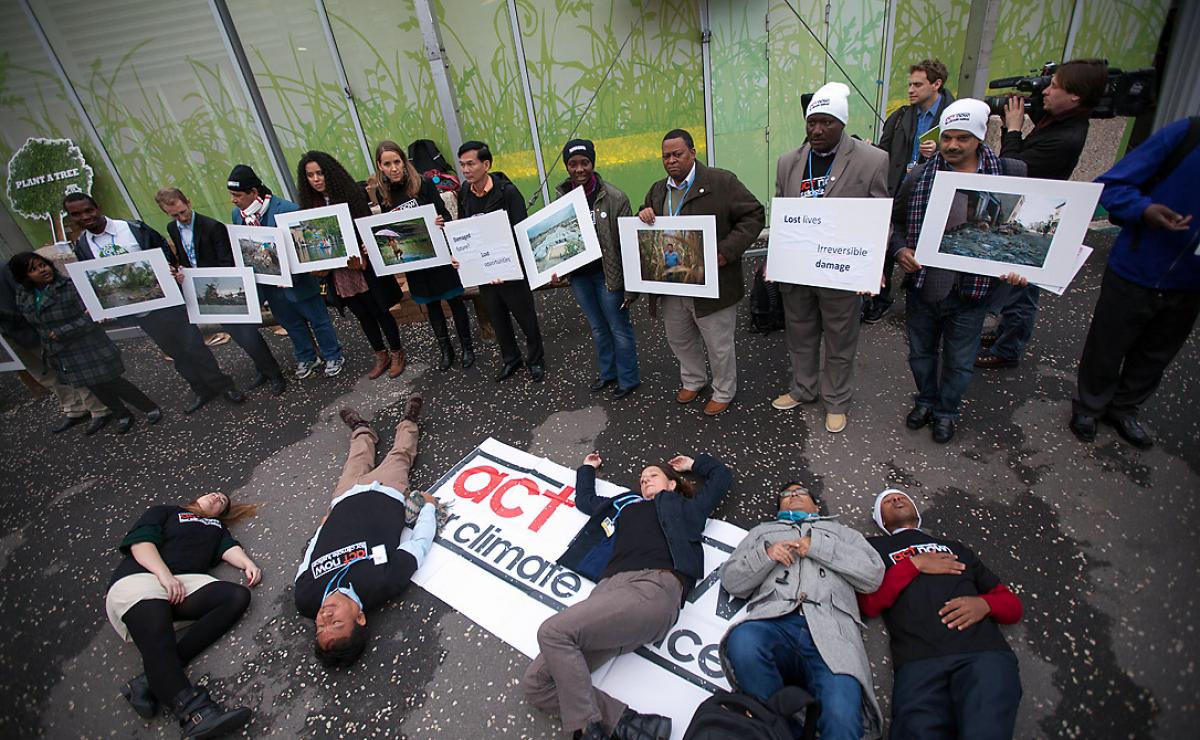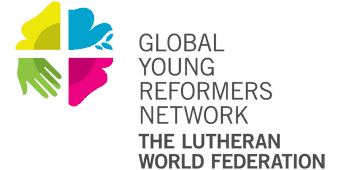“Leave no one behind”

COP 21 must tackle climate risks of the poorest and most vulnerable
(LWI) - Climate-induced loss and damage is one of the key points being raised by faith groups during COP21. A discussion panel and a demonstration held at COP21 in early December brought to light many facets of this issue.
On 3 December, Bread for the World promoted a space for reflection and discussion at the German pavilion of COP21. Participants focused on the issue of environmental loss and damage.
Rev. Dr Cornelia Füllkrug-Weitzel, president of Bread for the World, opened the panel by sharing a study produced in partnership with the ACT Alliance and Germanwatch. The study led to adoption of a position paper.
Based on data provided by UN special agencies, scientific research and the insurance industry, the study concludes that economic and non-economic losses associated with extreme weather events, droughts, floods, sea level rise and other slow-onset events are increasing fast.
Due to both higher exposure to hazards and lower resilience, the effects of these climate events are felt more strongly in the poorer countries.
“Apart from severe economic losses mostly affecting agriculture, water security, fisheries and coastal infrastructure, the study identifies climate-induced displacement and migration and the loss of territories and cultural heritage due to sea level rise,” said Füllkrug-Weitzel.
“In 2013 alone, 22 million people were displaced due to environmental hazards – three times more than due to armed conflicts,” she added, quoting a 2014 report of the Norwegian Refugee Council.
Another participant on the panel, Hon Pa Ousman Jarju, government minister in Gambia for Environment, Climate Change, Forestry, Water and Wildlife said that adaptation alone is not enough.
“There are residual impacts of climate induced loss and damage. How do you adapt when half of your economy is impacted by losses caused by climate events?” he asked.
The ecumenical demand in Paris is that loss and damage be included in the agreement in order to have a robust political basis for future climate risk prevention, reduction and transfer. A pattern for such considerations was set at COP19 in 2013, with the proposal of the “Warsaw International Mechanism for Loss and Damage associated with Climate Change Impacts”.
Füllkrug-Weitzel explained, “Our clear focus as an evangelical organization is on the world’s poorest and most vulnerable people. They are increasingly exposed to climate risks threatening their lives and livelihoods.”
“We all have to take action to prevent and better manage climate risks”, she added.
A day later, on 4 December, “ACT Now for Climate Justice” campaigners staged a vivid “die-in” in the middle of the COP21 venue to demonstrate the lost lives, lost opportunities and irreversible damage facing countries on the front line of climate change.
The “ACT Now for Climate Justice” is an initiative led by the ACT Alliance, a coalition of 137 faith-based organizations, and including churches, working together in over 100 countries to create positive and sustainable change in the lives of poor and marginalized people.
Mariana Paoli, International Advocacy Adviser at Christian Aid, believes that the demonstration was strategically important to help step up the pressure on negotiators in Paris to make sure they include loss and damage in the negotiations and anchor the Warsaw mechanism in the eventual Paris deal.
The campaigners made their voices heard clearly at the COP21 as they displayed images of climate related impacts representing millions of people who are affected, who are displaced or who die because of climate change, according to Paoli.
Daily reality in India
For Pranita Biswasi, a delegate of The Lutheran World Federation at COP 21, the reality of loss and damage is part of her daily life in India.
"We all know that life cannot exist without water. But what about thousands of people drowning due to heavy floods today in the southern part of India? Who is going to compensate for the loss and damage they are facing now?” she asked.
“If not compensation, are the political leaders ready to open up their lavish homes to give shelter and food to the vulnerable, who do not at all deserve to face these disasters?” added Biswasi.
The UN climate talks being held in Paris continue until 11 December. The second week of the summit is seen by many as the crucial period of the 20-year long process that aims to build a solid climate agreement.
Read the study on loss and damage by Bread for the World
